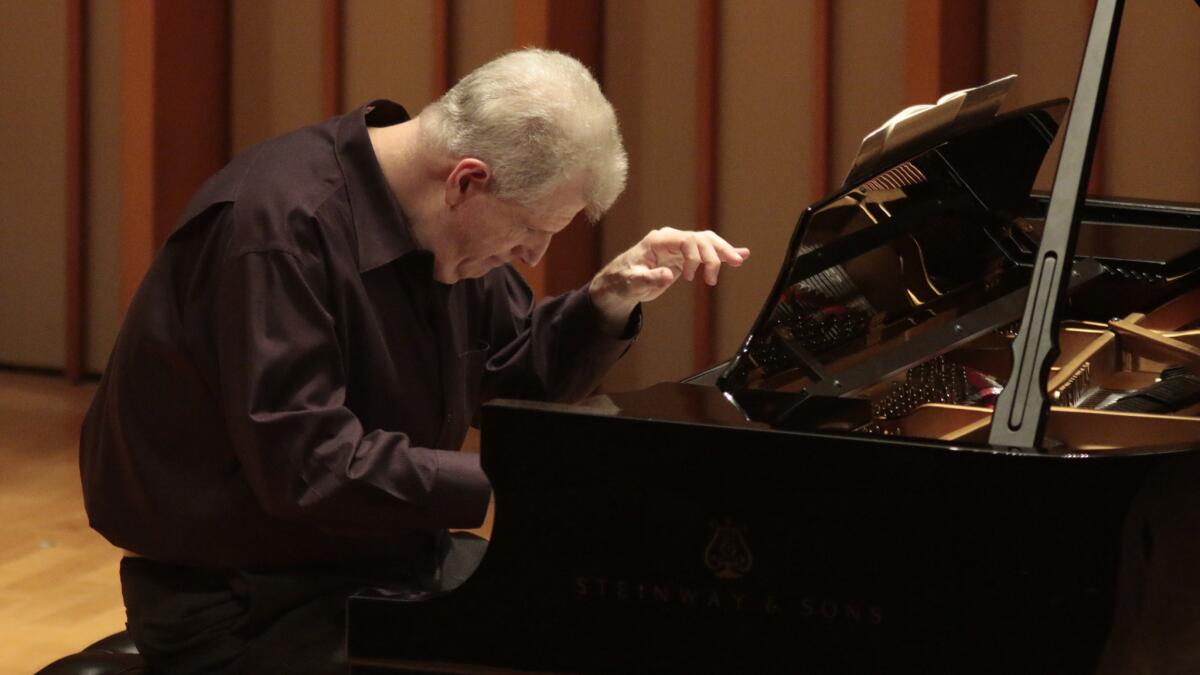Review: Humble virtuoso Mark Robson’s piano weaves his highly personal tales

- Share via
Reminiscent of a virtuoso of yore, Mark Robson sits at the piano as though an artisan at his worktable. His eyes follow the score intently. His hands shape phrases with supple expertise. His facial expression could be surgeon’s concentration on the task at hand. His shoulders sometimes move with the music, but that’s about as far as showmanship goes.
While lacking nothing in musicianship, Robson is said to lack careerist ambition, a pianist content to play local recitals, serve as rehearsal pianist for the Los Angeles Opera and occasionally help out at the Los Angeles Philharmonic. He doesn’t record. In a Lang Lang era, Robson’s refreshing, stimulating, ever-satisfying performances are not about him.
Except when they are about him, as was the case Tuesday night with Robson’s annual Piano Spheres recital at the Colburn School’s Zipper Concert Hall. Given that he has the massive technique to play anything he wants, what he wants becomes of great, and revealing, interest.
Tuesday’s choices were mostly modest and individual. He called the program “True Life Stories,” the title of five highly personal meditations for piano by Mark-Anthony Turnage on the first half of the program. There was also the premiere of Robson’s own “Nel Mezzo del Cammino …,” the pianist’s taking stock of his life in mid-career.
Robson began — as he never had before, he told the audience — with a boogie woogie. If this dry yet arousing beginning with Morton Gould’s witty 1943 “Boogie Woogie Etude” was unpredictable, he said he got the idea from playing the music of Dutch composer Louis Andriessen.
The other pieces on the first half were all short pieces with associations to individuals. Two etudes by Augusta Read Thomas were a homage to French composers Olivier Messiaen (“Cathedral Waterfall”) and Pierre Boulez (“On Twilight”) — the first, beautiful in its resonances; the second, quickly scurrying.
Turnage’s five meditations included an elegy to the British composer’s brother, two sweet scores for Turnage’s sons, William and Edward, as well as a song for his publisher and a tune for Japanese composer Toru Takemitsu. These short pieces verge on eavesdropping into what maybe could remain private. Robson drained them of cloying emotion. He let the final note to “William’s Pavane” resonate long, and the piano became the subject, not young William.
Robson’s own piece, its introspective misty chords and raindrop articulations, had the nature of wistful late-night thoughts. The pianist didn’t dwell but rather seemed to let his fingers have thoughts of their own.
If the first half of Robson’s recital was strange; the second half was stranger but also more fulfilling. Charles Griffes’ little known “De Profundis” is another work of private musings. In his notes, Robson noted that the early 20th century American composer, who was gay, probably saved himself from scandal by dying early. This melancholic short piece, written in 1915 but not published until 1978 (58 years after Griffes’ death) was officially inspired by a melodramatic 1891 poem by William Sharp but no doubt really reflective of Oscar Wilde’s prison poem, “De Profundis.”
The music could fit an artful silent film. But Robson turned melodrama into deep melancholy by simply letting Impressionistic harmonies resonate gorgeously and symbolism speak for itself.
That was followed by a study in pure resonance, Vera Ivanova’s minimalist “Mbira,” written two years ago, and then a rare performance of Rudolf Escher’s “Arcana,” which proved a significant discovery.
The Dutch composer, who was a nephew of the Surrealist artist M.C. Escher, wrote this 20-minute four-movement suite during the Nazi occupation of the Netherlands. The style, which is primarily French, is not remarkable. There are elements of Ravel and early Messiaen in the keyboard writing. The movements have classical titles — Prelude, Toccata, Chaconne and Finale.
There is no program to the suite, but the alchemical title, the composer noted, was meant to suggest “secret remedy.” This is music in the time of terror. Uncertainty can be heard in every page. But so can promise. Brooding lines suddenly blossom into sumptuous cascades of notes, as if fields of tulips. Doors cautiously open to the outside world in sly melodies and then are slammed shut by militant march rhythms.
There is a decent recording of “Arcana” by the Dutch pianist Theo Bruins, but Escher has received little attention beyond Holland’s borders. Robson’s performance was magnificent. Were he to record “Arcana,” the world might notice.
Twitter: @markswed
More to Read
The biggest entertainment stories
Get our big stories about Hollywood, film, television, music, arts, culture and more right in your inbox as soon as they publish.
You may occasionally receive promotional content from the Los Angeles Times.











